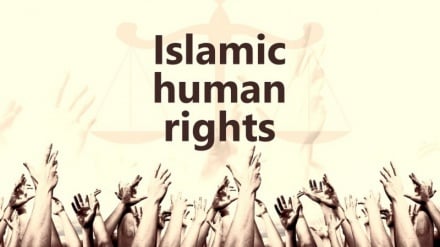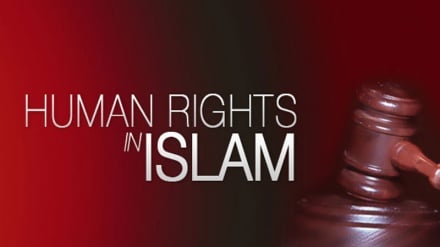Islamic Human Rights (32)
Welcome to the 32nd weekly episode of the series Islamic Human Rights. Today, we study the boundaries of freedom of expression in the view of divine religion of Islam.
Dear listeners, last week we discussed freedom of expression, as one of the main and most important human rights. Throughout many communities, freedom of expression plays a decisive and vital role in materialization of democracy. This is because the materialization of many freedoms is tied to maintenance of freedom of expression. Rights such as freedom of press, freedom of religion, freedom of speech, and freedom of assembly are all rooted in freedom of expression. Furthermore, freedom of expression makes it possible for the members of the community to present their demands.
Also, it was stated that none of the world’s legal systems grant absolute freedom of expression, and each country, in line with its ideology and level of commitment to ethical principles, has specified a number of restrictions for freedom of expression.
Freedom of expression is not absolute, and maintains restrictions, which have been mentioned in human and international rights documents. The acceptable restrictions on freedom of expression comprise a number of domains, including national security; public security; public order; general ethics; and a number of other rights and freedoms.
This means that despite the importance attached to freedom of expression; these restrictions should not be violated.
According to contemporary thinker, Allameh Jafari, personal freedom; especially freedom of expression should be based on wisdom and prudence. He then notes that prudence or imprudence of freedom is tied to terms of usage of freedom. Any freedom of expression, which is utilized to the material and spiritual detriment of mankind, is unwise. However, if freedom of expression is used in line with beneficial human principles and rules and regulations, it will be wise and prudent.
In view of Islam, all are free to express their views, unless the related view is in contrast to interests of mankind; namely his material and spiritual interests. In the view of Islam, freedom of expression maintains a number of restrictions, which should be complied with. One of these restrictions is prohibition of insults against sacred values. If we consider the goal of freedom of expression to be transference of thoughts to addressees for the growth of the individual and community; insulting others’ sacred values will result in the resentment and reaction of the other party. Therefore, based on Islamic teachings, Muslims have been instructed to refrain from insulting others’ sacred values.
Maintenance of the reputation and dignity of the members of community and avoidance of humiliation of individuals is one of the other restrictions of freedom of expression.
Maintenance of public order and commitment to rules and regulations is a religious and logical necessity. Hence, in the realm of freedom of expression, any breach of rules and regulations, which emphasize safeguard of security, and fulfillment of the interests of Islamic community, is forbidden. The restriction of freedom of members of the community before law is highly emphasized by all of the world’s ruling systems.
Ethics also plays a significant role in the divine religion of Islam. Social life is in need of ethical norms and values. In Islam’s view, mankind cannot attain and maintain freedom of expression via negligence of ethical principles and values governing the Islamic community. Hence, any remark that would be to the detriment of ethical principles of the community, and would harm ethical norms, is in contrast to freedom of expression.
One of the other restrictions on freedom of expression is that no member of the community should pursue corrupt political intentions, and no one should conspire against the Islamic ruling system, via promotion of personal and partisan thoughts. Otherwise, the Islamic ruling system would be allowed to prevent the freedom of expression of individuals who maintain corrupt political intentions, and/or conspire against the Islamic establishment.
Many Islamic thinkers, within the framework of theological texts, and religious thoughts, have elaborated on the conditions and restriction of freedom of expression. The contemporary thinker, Martyr Morteza Mottahari, attaches significant importance to freedom of expression. He believes that man should be free to achieve growth and development, and the growth of mankind is tied to three factors which are upbringing, security, and freedom.
In the view of this contemporary Islamic thinker, free men are those who stand firm against any hurdle which impedes their growth and development. Such individuals do not submit to hurdles. Meanwhile, the individual, who under the name of freedom, tries to spread corruption and immoralities is in fact against freedom. An individual who tries to destroy social values is not a supporter of freedom. An individual, who spreads misdeeds, violates freedom, because such efforts do not serve the growth and elevation of mankind.
Hence, Martyr Mottahari puts emphasis on two points. Firstly, freedom should lead to growth of mankind, and secondly freedom of expression should be far from deception.
Freedom of expression is one of the most important Islamic rights and values, which highly influences the growth of personal talents; the material and spiritual development of the community; and reformation of structures of the community. Hence, Islamic teachings, ayahs of Holy Quran, and the tradition of the Prophet of Islam’s Infallible Household (Peace be upon them) consider freedom of expression as a religious right and duty, while instructing all members of the community to make use of this divine blessing.
In view of religious teachings, and many of the world’s thinkers, freedom of expression only functions property if it is enforced within the framework of logical conditions. This is because absolute freedom is to the detriment of the individual and community.
MR/SS


